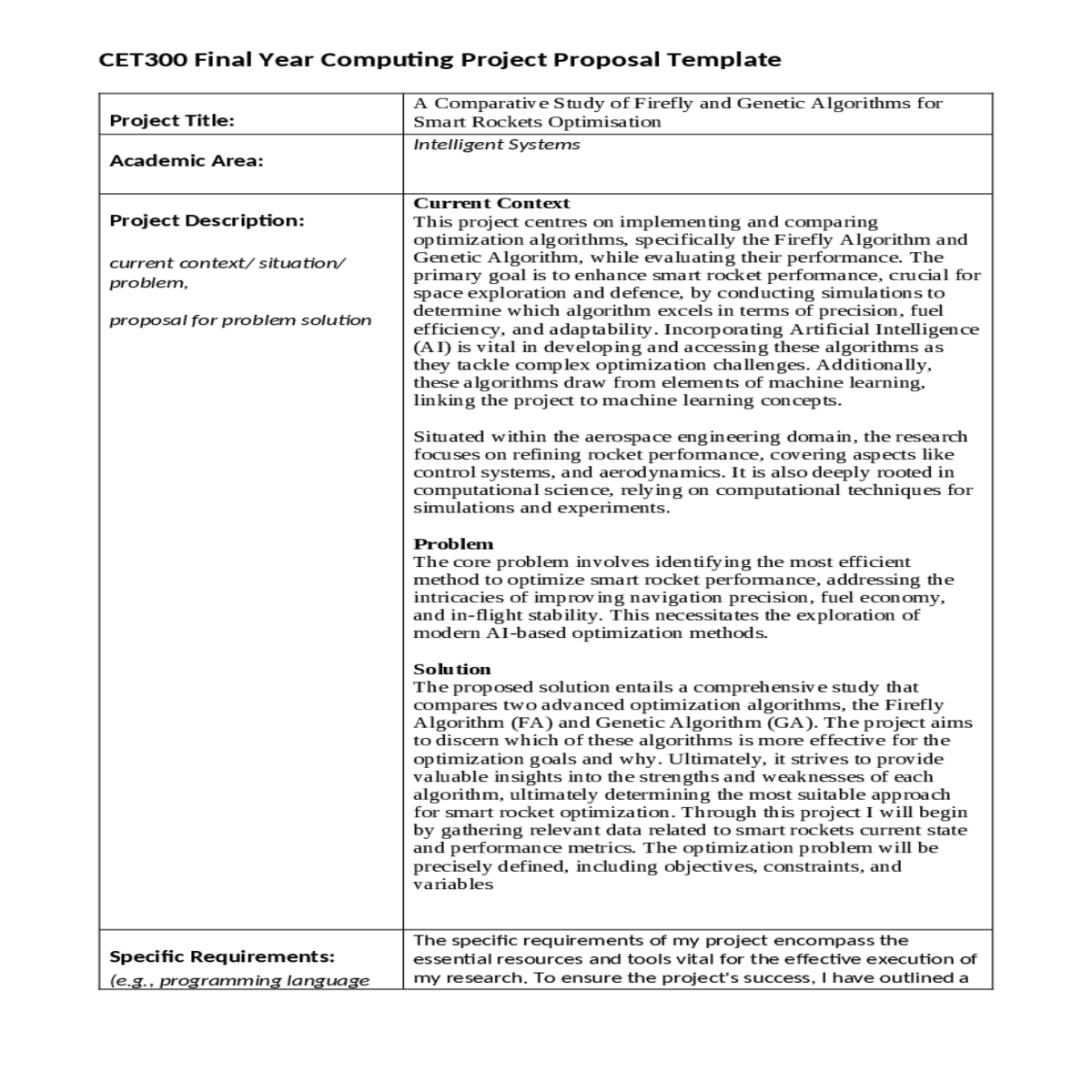The firefly algorithm and genetic algorithm
Project Title: |
A Comparative Study of Firefly and Genetic Algorithms for Smart Rockets Optimisation |
|---|---|
Academic Area: |
Intelligent Systems |
Project Description:current context/ situation/ problem, proposal for problem solution |
The core problem involves identifying the most efficient method to optimize smart rocket performance, addressing the intricacies of improving navigation precision, fuel economy, and in-flight stability. This necessitates the exploration of modern AI-based optimization methods. Solution |
Specific Requirements: |
In terms of software, I require specific tools and libraries for implementing the Firefly Algorithm and Genetic Algorithm, as well as for the comprehensive analysis of data. Key Python libraries like NumPy, SciPy, and scikit-learn play a pivotal role, as they enable fundamental numerical operations, optimization routines, and data handling. The DEAP (Distributed Evolutionary Algorithms in Python) library is an asset for the implementation of Genetic Algorithms, offering a robust platform for experimentation. Data visualization is facilitated by libraries like Matplotlib and Seaborn, contributing to the interpretation and presentation of research findings. Jupyter Notebooks provide an interactive and user-friendly environment for code development, documentation, and information sharing. Python's extensive data analysis capabilities, including libraries like Pandas, allow for efficient handling and analysis of experiment-generated data. Additionally, machine learning frameworks, such as scikit-learn or TensorFlow, are an integral part of the research. These frameworks are vital, as machine learning components are embedded within the project's scope. |
Practical Outcome:It is the student’s responsibility to propose a solution with which the supervisor agrees. |
The research aims to produce a comprehensive comparative analysis of the Firefly Algorithm and Genetic Algorithm within the specific context of optimising smart rockets. This analysis will show insights into their respective strengths and weaknesses, as well as their practical implications for the improvement of the trajectory of smart missiles. In essence, the research outcome will serve as a valuable asset for aerospace engineers and researchers. It provides a robust framework for algorithm selection and offers invaluable insights into the practical implications of choosing between the Firefly Algorithm and Genetic Algorithm for optimizing smart rockets. |
Research Focus:(Topic of literature review that will help inform the product development) |
Overall, this project's research centres on the comparative analysis and evaluation of optimization algorithms in the specific context of smart rockets. The goal is to enhance the performance of smart rockets and provide valuable practical insights for the aerospace industry. This study serves as an interdisciplinary bridge, spanning various academic domains and offering real-world implications in the realm of aerospace engineering. |
Preliminary Reading List:(5 background articles/key texts/seminal research publications to kick start the project) |
Bacanin, N. et al. (2021) ‘Performance of a Novel Chaotic Firefly Algorithm with Enhanced Exploration for Tackling Global Optimization Problems: Application for Dropout Regularization’, Mathematics (Basel), 9(21), p. 2705–. Available at: https://doi.org/10.3390/math9212705. |
Ethical Considerations:(e.g., if the project involves working with vulnerable people/children's students will need a police/disclosure check (DBS) be undertaken.) |
|
Supervisor Details: |
Name: Safina Ara Contact Details: |
Student Signature: |
|
Module Leader Signature: |
Signature: Date: |





